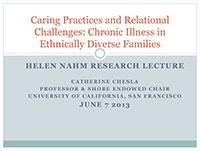
Catherine (Kit) Chesla delivers the 33rd Helen Nahm Research Lecture
Managing Chronic Illness in Ethnically Diverse Families
On June 7, Catherine (Kit) Chesla, UC San Francisco School of Nursing’s Thelma Shobe Endowed Chair in Ethics and Spirituality, delivered the 33rd Helen Nahm Research Lecture to an audience of clinicians, researchers and other colleagues at the School’s Parnassus campus.
Chesla’s distinguished career has focused on families and chronic illness in adult families from diverse ethnicities. She is the author or co-author of numerous studies and a contributor to several books, including the seminal Expertise in Nursing Practice: Caring, Clinical Judgment, and Ethics, which she co-wrote with her mentor, Patricia Benner, and co-author Christine Tanner.
Chesla’s lecture, “Caring Practices and Relational Challenges: Chronic Illness in Ethnically Diverse Families,” outlined why families and family culture are important to health, and discussed some of Chesla’s research into how families affect both the experience and management of chronic illness in a member.
Families Are a Factor in Disease Outcomes
 Evidence from a comprehensive review of the literature suggests that certain family-related factors – such as conflict, family isolation or rigidity – are risk factors for poorer outcomes for several chronic conditions, including asthma, depression, migraines and schizophrenia. Other family traits – such as emotional closeness, supportive relationships, clear family organization and direct communication about illness – are protective. Additionally, intervention research in chronic illness suggests that using a family as opposed to an individual approach has positive effects on both patient outcomes – such as mortality and quality of life – and family outcomes, such as burden. It also improves mental health outcomes for both the patient and the family.
Evidence from a comprehensive review of the literature suggests that certain family-related factors – such as conflict, family isolation or rigidity – are risk factors for poorer outcomes for several chronic conditions, including asthma, depression, migraines and schizophrenia. Other family traits – such as emotional closeness, supportive relationships, clear family organization and direct communication about illness – are protective. Additionally, intervention research in chronic illness suggests that using a family as opposed to an individual approach has positive effects on both patient outcomes – such as mortality and quality of life – and family outcomes, such as burden. It also improves mental health outcomes for both the patient and the family.
Looking at Family Patterns and Disease Management
Chesla’s research has taken multiple approaches to understanding families and health: from an interpretive standpoint, looking at the practices families develop for caring for chronically ill members; from a descriptive standpoint, looking at the features of family life that contribute to managing chronic illness; and from an intervention standpoint, investigating how to help patients and families better manage chronic illness.
The significance of family culture emerged as a particularly important factor in several studies Chesla has conducted among Chinese American immigrant families. She and her colleagues have described how current models of diabetes education and care can clash with Chinese culture and family processes. The team has outlined how these models can adapt to better serve patients and their families; for example, by taking into account the importance in Chinese culture of the idea of balance and the need to address the family’s needs and concerns.
Building on that research, Chesla and her colleagues have developed and tested a culturally adapted cognitive behavioral intervention to improve management of type 2 diabetes, finding that this approach led to improvements in understanding of diabetes, family support, and distress among patients.
While the field of family health research grew up during her lifetime, Chesla says health scientists and clinicians now recognize that chronic illness is a family affair. She hopes that ongoing research will continue to inform practice and improve the way families are incorporated as partners in health care.



